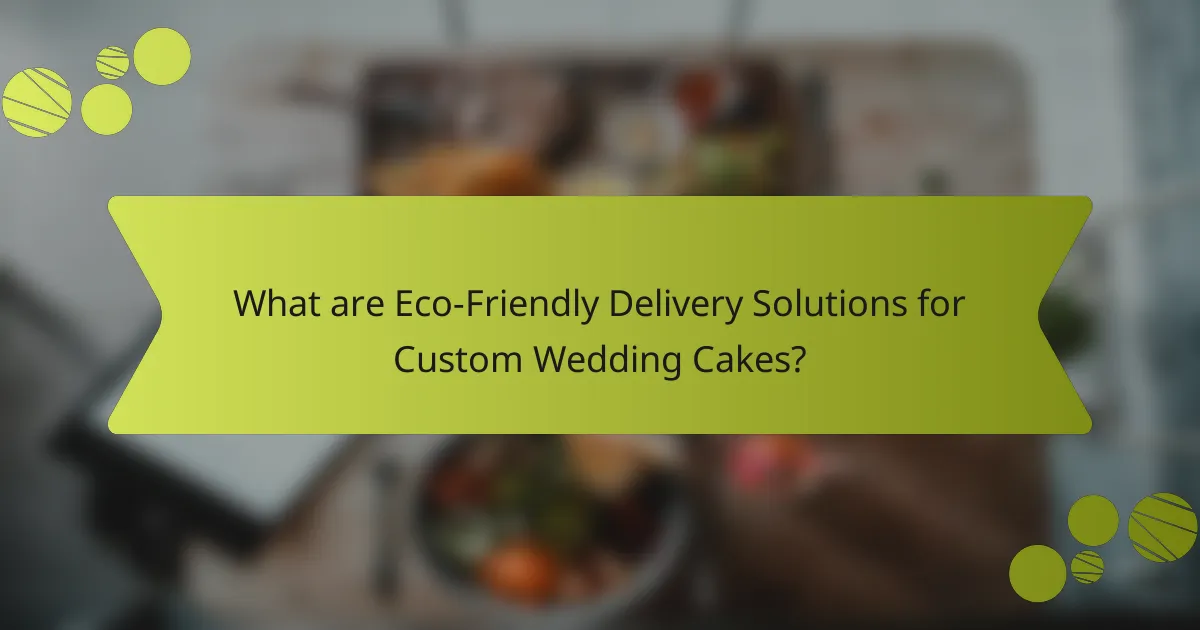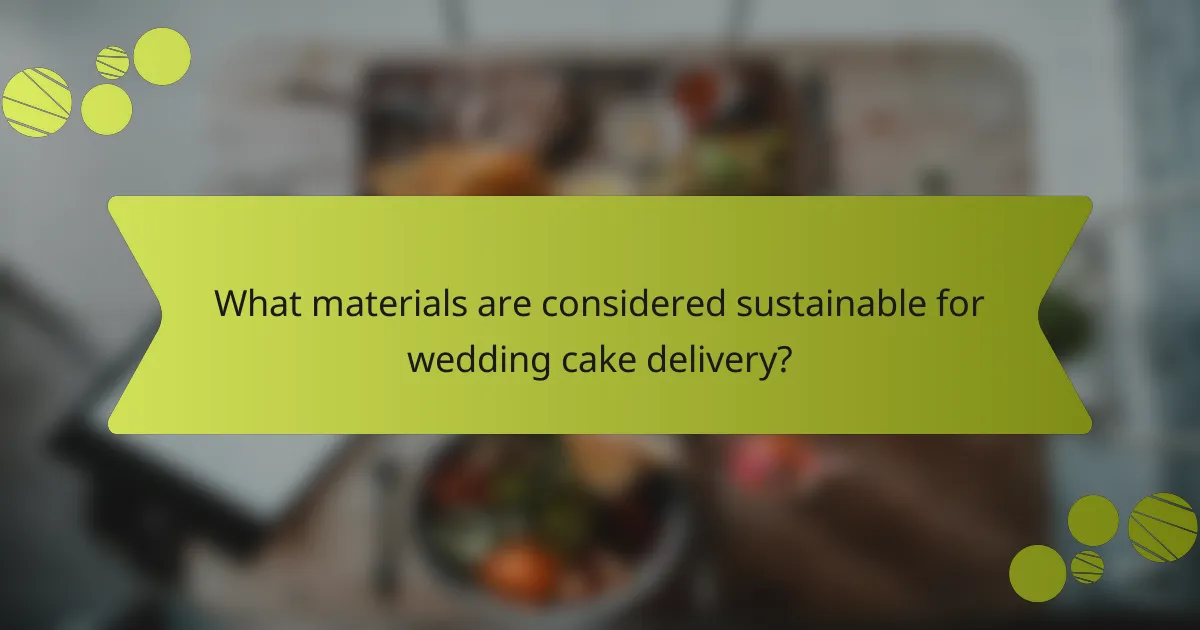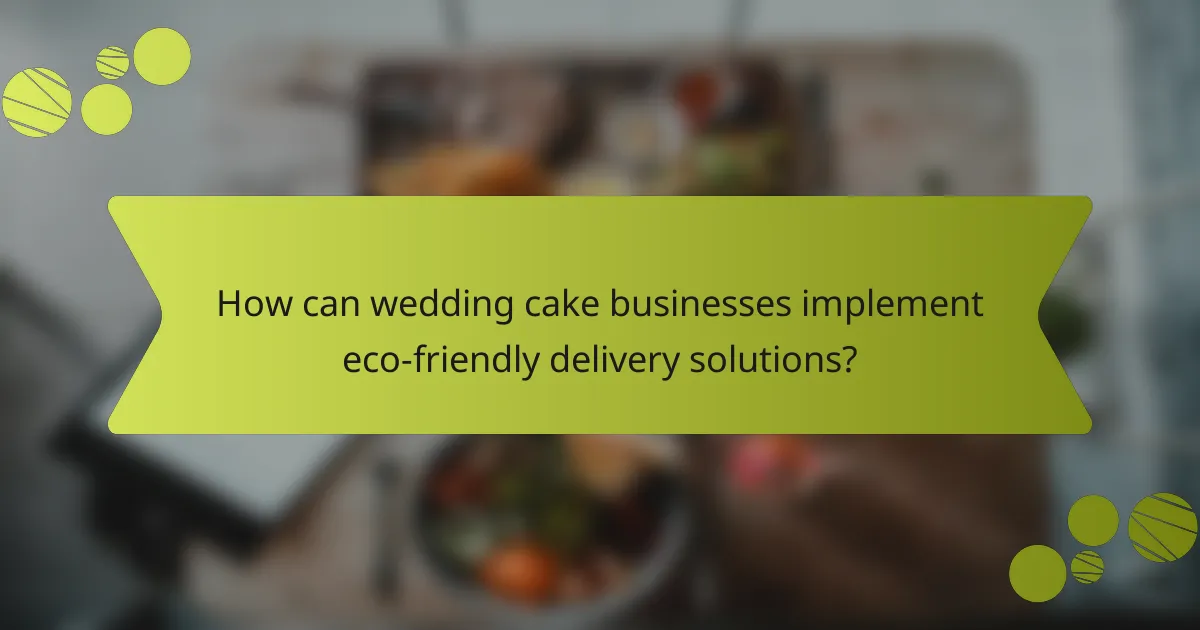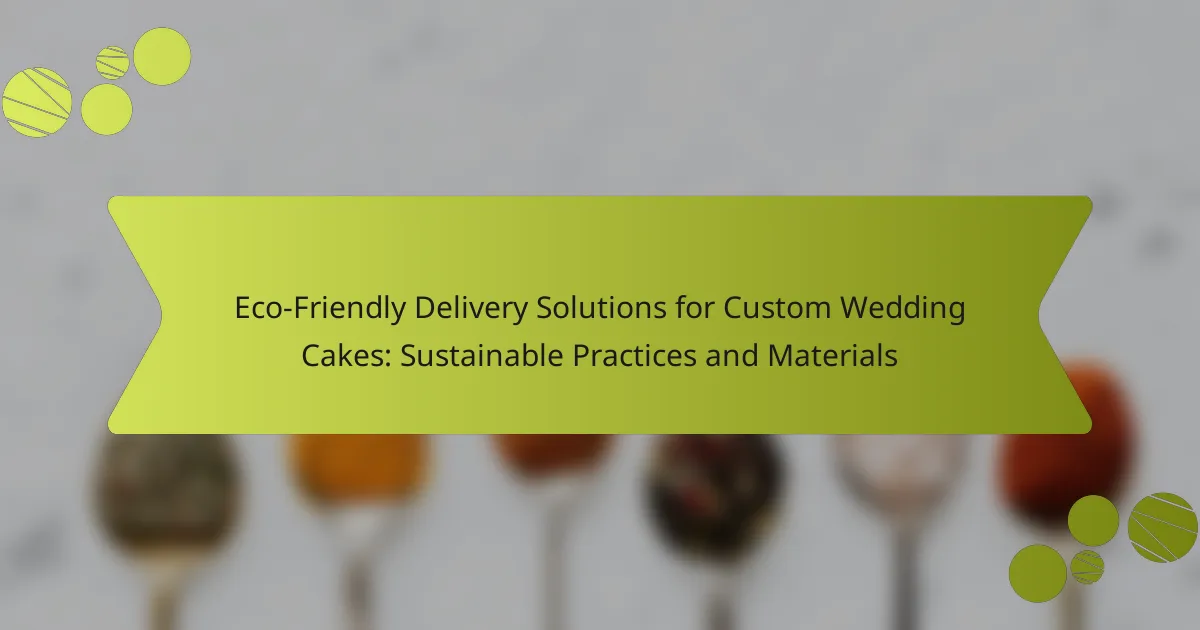Eco-friendly delivery solutions for custom wedding cakes focus on sustainable practices and materials to minimize environmental impact. Key strategies include the use of biodegradable packaging, electric vehicles, and local ingredient sourcing, which collectively reduce waste and carbon footprints. Additionally, implementing reusable containers and optimizing delivery routes can enhance sustainability efforts. The article also highlights the importance of partnering with eco-conscious delivery services and encourages local pickups to further support green initiatives in the wedding industry. These practices promote a more sustainable approach to cake delivery while benefiting businesses and the environment.

What are Eco-Friendly Delivery Solutions for Custom Wedding Cakes?
Eco-friendly delivery solutions for custom wedding cakes include using biodegradable packaging and electric vehicles. Biodegradable packaging reduces waste and minimizes environmental impact. Electric vehicles produce no emissions, making them a sustainable transport option. Local sourcing of ingredients also contributes to eco-friendliness by reducing transportation distances. Delivery services can implement reusable containers to further decrease waste. Utilizing bicycle couriers is another green option, especially in urban areas. These methods collectively promote sustainability in cake delivery.
How do eco-friendly delivery solutions differ from traditional methods?
Eco-friendly delivery solutions prioritize sustainability over traditional methods. They often utilize electric or hybrid vehicles, reducing carbon emissions significantly. Traditional delivery methods typically rely on gasoline-powered vehicles, contributing to air pollution. Eco-friendly solutions may also use biodegradable packaging materials. This contrasts with conventional packaging, which often involves plastics that harm the environment. Additionally, eco-friendly deliveries often focus on optimizing routes to minimize fuel consumption. Traditional methods may not prioritize route efficiency, leading to higher emissions. Studies show that eco-friendly delivery practices can reduce overall environmental impact by up to 30%. This highlights the effectiveness of sustainable delivery solutions in comparison to traditional methods.
What are the key characteristics of eco-friendly delivery solutions?
Eco-friendly delivery solutions prioritize sustainability and reduce environmental impact. They utilize electric or hybrid vehicles to minimize carbon emissions. These solutions often incorporate reusable packaging to decrease waste. They also optimize delivery routes to reduce fuel consumption and delivery times. Many eco-friendly services partner with local suppliers to support community economies. They may offer carbon offset options to compensate for unavoidable emissions. Transparency in sourcing and practices is a common characteristic. Finally, they often engage in eco-conscious marketing to promote their sustainability efforts.
Why is sustainability important in wedding cake delivery?
Sustainability is important in wedding cake delivery because it minimizes environmental impact. Eco-friendly practices reduce waste generated during transportation. Sustainable delivery methods often use recyclable or biodegradable packaging. This helps decrease landfill contributions. Additionally, using local ingredients reduces carbon footprints associated with long-distance shipping. Research indicates that local sourcing can cut emissions by up to 50%. Implementing sustainable practices also appeals to environmentally conscious couples. They are increasingly seeking vendors who align with their values. This can enhance customer loyalty and brand reputation within the wedding industry.
What sustainable practices are commonly used in eco-friendly delivery?
Eco-friendly delivery often employs several sustainable practices. These practices include using electric or hybrid vehicles to reduce carbon emissions. Companies may also utilize bicycle couriers for local deliveries, minimizing the environmental impact. Additionally, eco-friendly packaging materials are commonly used. These materials are often biodegradable or recyclable. Route optimization is another key practice. This approach reduces fuel consumption and delivery times. Some companies also implement a carbon offset program to balance emissions. Finally, partnerships with local suppliers can further enhance sustainability. These practices collectively contribute to a greener delivery system.
How do packaging materials contribute to sustainability in delivery?
Packaging materials contribute to sustainability in delivery by reducing waste and promoting recyclability. Eco-friendly packaging options, such as biodegradable and compostable materials, minimize environmental impact. These materials break down naturally, unlike traditional plastics that persist in landfills. Additionally, sustainable packaging often uses renewable resources, decreasing reliance on fossil fuels. Efficient packaging design reduces the volume and weight of shipments, lowering carbon emissions during transport. According to a study by the Ellen MacArthur Foundation, sustainable packaging can reduce greenhouse gas emissions by up to 70%. By choosing sustainable packaging, businesses can enhance their environmental responsibility while meeting consumer demand for eco-friendly practices.
What role does route optimization play in reducing carbon footprints?
Route optimization significantly reduces carbon footprints by minimizing the distance traveled during deliveries. Shorter routes lead to lower fuel consumption, which directly decreases greenhouse gas emissions. According to a study by the U.S. Environmental Protection Agency, optimizing delivery routes can reduce fuel use by up to 10-30%. This reduction not only lowers operational costs for businesses but also contributes to environmental sustainability. Efficient routing software can analyze traffic patterns and delivery schedules to ensure the most eco-friendly paths are taken. By implementing these strategies, companies can align their logistics with sustainability goals, reducing their overall environmental impact.

What materials are considered sustainable for wedding cake delivery?
Sustainable materials for wedding cake delivery include biodegradable boxes, recycled cardboard, and reusable containers. Biodegradable boxes decompose naturally, reducing waste. Recycled cardboard is made from post-consumer materials, minimizing resource consumption. Reusable containers can be returned or repurposed, promoting a circular economy. Additionally, some bakers use plant-based packing peanuts for cushioning. These materials align with eco-friendly practices, supporting sustainability in the wedding industry.
Which packaging materials are eco-friendly and effective?
Biodegradable materials are eco-friendly and effective for packaging. These materials break down naturally and reduce environmental impact. Examples include cornstarch-based foam, which is compostable and provides cushioning. Recycled paper and cardboard are also sustainable options. They are recyclable and biodegradable. Plant-based plastics, like PLA, offer an alternative to traditional plastics. They are derived from renewable resources and can be composted. Glass containers are reusable and recyclable, making them a sustainable choice. Overall, these materials contribute to reducing waste and promoting sustainability in packaging.
What are the benefits of using biodegradable packaging?
Biodegradable packaging reduces environmental impact by decomposing naturally. It minimizes landfill waste, as it breaks down into non-toxic components. This packaging type often uses renewable resources, contributing to sustainability. Studies show that biodegradable materials can decrease pollution levels compared to traditional plastics. For example, a report by the Ellen MacArthur Foundation highlights that reducing plastic waste can significantly lower greenhouse gas emissions. Additionally, biodegradable packaging enhances brand reputation. Consumers increasingly prefer eco-friendly options, influencing purchasing decisions positively.
How do reusable containers impact sustainability?
Reusable containers significantly enhance sustainability by reducing waste and conserving resources. They minimize the need for single-use packaging, which contributes to landfill overflow. According to the Environmental Protection Agency, packaging waste accounts for about 30% of municipal solid waste in the U.S. Reusable containers also lower carbon emissions associated with production and disposal. A study by the Ellen MacArthur Foundation indicates that transitioning to reusable packaging could reduce greenhouse gas emissions by 60% by 2030. Additionally, they promote a circular economy by encouraging reuse and recycling. This shift can lead to significant savings in raw materials and energy. Overall, reusable containers are a crucial element in sustainable practices for businesses, including those in the wedding cake industry.
What certifications or standards should eco-friendly materials meet?
Eco-friendly materials should meet certifications such as FSC (Forest Stewardship Council) for responsible sourcing. They should also comply with ISO 14001, which sets out effective environmental management systems. Additionally, materials can be certified organic by USDA, ensuring they are grown without harmful chemicals. Cradle to Cradle certification assesses the safety and sustainability of products. Finally, Energy Star certification indicates energy efficiency in production processes. These certifications help ensure that eco-friendly materials contribute positively to environmental sustainability.
How can consumers identify truly sustainable materials?
Consumers can identify truly sustainable materials by examining certifications and labels. Look for recognized certifications such as FSC, GOTS, or Cradle to Cradle. These certifications indicate adherence to sustainability standards. Additionally, consumers should assess the source of materials. Renewable resources, like bamboo or recycled materials, are more sustainable. Transparency from brands about their supply chain is also crucial. Brands that disclose their sourcing practices often prioritize sustainability. Lastly, consider the lifecycle of materials. Products that are biodegradable or compostable contribute to sustainability. These factors combined help consumers make informed choices about sustainable materials.
What are the consequences of using non-sustainable materials?
Using non-sustainable materials leads to environmental degradation and resource depletion. These materials often contribute to pollution and waste accumulation. For instance, plastic waste can take hundreds of years to decompose. Additionally, non-sustainable materials may result in increased carbon emissions during production. This exacerbates climate change and impacts biodiversity. The use of such materials can also harm ecosystems and wildlife. Furthermore, consumers are increasingly favoring sustainable options, which can affect market competitiveness. Research shows that sustainable practices can enhance brand loyalty and customer satisfaction.

How can wedding cake businesses implement eco-friendly delivery solutions?
Wedding cake businesses can implement eco-friendly delivery solutions by using electric vehicles for transportation. Electric vehicles produce zero emissions, reducing the carbon footprint during delivery. Additionally, businesses can use biodegradable packaging materials. These materials decompose naturally, minimizing waste in landfills.
Another approach is to optimize delivery routes to reduce travel distance. Efficient routing can lower fuel consumption and delivery times. Businesses can also encourage local pickups to eliminate delivery altogether. This practice supports community engagement and reduces transportation emissions.
Furthermore, partnering with eco-conscious delivery services can enhance sustainability efforts. These services often prioritize green practices and align with the business’s values. Implementing these strategies can significantly contribute to a more sustainable delivery process for wedding cakes.
What steps should businesses take to transition to eco-friendly practices?
Businesses should assess their current practices to transition to eco-friendly methods. First, they should conduct a sustainability audit to identify areas for improvement. Next, businesses can switch to biodegradable or recyclable packaging materials. Implementing energy-efficient appliances can significantly reduce energy consumption. Additionally, sourcing ingredients locally minimizes transportation emissions. Training staff on sustainability practices fosters a culture of environmental responsibility. Finally, businesses should regularly review and update their eco-friendly initiatives to ensure continuous improvement. These steps contribute to a more sustainable operational model.
How can businesses educate their customers about sustainable options?
Businesses can educate their customers about sustainable options through various strategies. They can provide informative content on their websites and social media platforms. This content should highlight the benefits of sustainable practices. Workshops and webinars can also be organized to engage customers directly. Collaborations with environmental organizations can enhance credibility. Offering product samples that showcase sustainable materials can create awareness. Clear labeling of eco-friendly products helps customers make informed choices. Regular newsletters can update customers on new sustainable options. Research shows that 66% of consumers are willing to pay more for sustainable brands, highlighting the importance of education in driving purchasing decisions.
What partnerships can enhance eco-friendly delivery efforts?
Partnerships with local farms can enhance eco-friendly delivery efforts. Sourcing ingredients locally reduces transportation emissions. Collaborating with green logistics companies further minimizes carbon footprints. These companies often use electric vehicles or sustainable practices. Partnering with eco-conscious packaging suppliers ensures biodegradable materials are used. This reduces waste from delivery packaging. Engaging with community organizations promotes awareness of sustainable practices. Such partnerships can also drive customer loyalty through shared values.
What are the challenges faced in adopting eco-friendly delivery solutions?
The challenges faced in adopting eco-friendly delivery solutions include higher costs, limited infrastructure, and consumer awareness. Higher costs arise from investing in sustainable packaging and electric vehicles. Limited infrastructure affects the availability of charging stations for electric delivery vehicles. Consumer awareness is often low regarding the benefits of eco-friendly delivery options. Additionally, logistics and supply chain complexities can hinder the implementation of these solutions. Regulatory hurdles may also pose challenges in certain regions. These factors collectively slow the transition to eco-friendly delivery methods.
How can businesses overcome logistical challenges?
Businesses can overcome logistical challenges by implementing efficient supply chain management. This includes optimizing inventory levels to reduce excess stock. Utilizing technology like route optimization software can enhance delivery efficiency. Collaborating with reliable logistics partners ensures timely and safe deliveries. Training staff on best practices improves operational performance. Regularly reviewing and adjusting logistics strategies can address emerging challenges. According to a report by the Council of Supply Chain Management Professionals, effective logistics management can reduce costs by 10-15%.
What cost considerations should be taken into account?
Cost considerations for eco-friendly delivery solutions for custom wedding cakes include packaging expenses, transportation costs, and labor fees. Sustainable packaging often costs more than traditional options. This is due to the use of biodegradable or recyclable materials. Transportation costs can vary based on distance and the vehicle’s fuel efficiency. Eco-friendly vehicles may have higher upfront costs but can save money on fuel in the long run. Labor fees may increase if specialized handling is required for delicate cakes. Overall, balancing these costs with the demand for sustainable practices is essential for profitability.
What best practices can ensure successful eco-friendly delivery of wedding cakes?
Use biodegradable packaging for wedding cake delivery. This reduces plastic waste and is environmentally friendly. Opt for reusable containers to minimize single-use items. Transport cakes in energy-efficient vehicles to lower carbon emissions. Schedule deliveries to avoid multiple trips, which conserves fuel. Choose local suppliers to decrease transportation distances. Implement temperature-controlled delivery methods to maintain cake quality without excess energy use. Ensure that delivery personnel are trained in eco-friendly practices to uphold sustainability standards.
How can businesses maintain quality while using sustainable practices?
Businesses can maintain quality while using sustainable practices by implementing strict quality control measures. These measures ensure that all materials used meet high standards. Sourcing organic and locally produced ingredients can enhance quality and sustainability. Regular training for staff on sustainable practices can improve product consistency. Utilizing eco-friendly packaging that protects the product is essential. Monitoring customer feedback helps in maintaining high standards. Collaborating with suppliers who prioritize quality and sustainability strengthens the overall product. Research indicates that businesses focusing on sustainability can achieve customer satisfaction without compromising quality.
What tips can help streamline the eco-friendly delivery process?
Optimize delivery routes to reduce fuel consumption. Using route planning software can enhance efficiency. Consolidate deliveries to minimize trips, reducing carbon emissions. Employ electric or hybrid vehicles for lower environmental impact. Utilize recyclable or biodegradable packaging materials to decrease waste. Communicate with customers about delivery times to ensure readiness. Train staff on eco-friendly practices to maintain consistency. Monitor and evaluate delivery processes regularly for improvements.
Eco-friendly delivery solutions for custom wedding cakes focus on sustainable practices and materials that minimize environmental impact. Key aspects include the use of biodegradable packaging, electric vehicles, and local sourcing of ingredients, which collectively contribute to reducing carbon emissions and waste. The article explores the differences between eco-friendly and traditional delivery methods, highlighting characteristics such as reusable containers and route optimization. It also addresses the importance of sustainability in wedding cake delivery, common practices employed, and the challenges businesses face in adopting these solutions.
